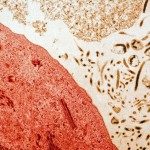Link to Pubmed [PMID] – 16621649
Microbes Infect. 2006 Apr;8(5):1194-202
Lassa fever is a hemorrhagic fever caused by Lassa virus (LV), which primarily targets human dendritic cells (DC) and macrophages (MP). Massive numbers of viral particles are released with no effect on the viability, activation or maturation of these cells. LV does not inhibit the activation of cells induced by sCD40L or LPS. We report here the consequences of exogenous activation of LV-infected human DC and MP for viral replication. The activation of cells with lipopolysaccharide or exogenous poly(I-C) and the transfection of cells with poly(I-C) strongly inhibited LV replication, at least partly by inducing type I interferon (IFN) synthesis. In contrast, cell stimulation with sCD40L did not induce type I IFN responses or inhibit LV release. Recombinant type I IFNs strongly inhibited LV replication in both cell types, whereas IFNgamma and IFNlambda did not. The modest type I IFN production observed in LV-infected MP, but not in DC, was involved in controlling LV replication in MP. These results provide an explanation for the slower replication of LV in MP than in DC, and suggest that type I IFNs are crucial in the control of LV.


